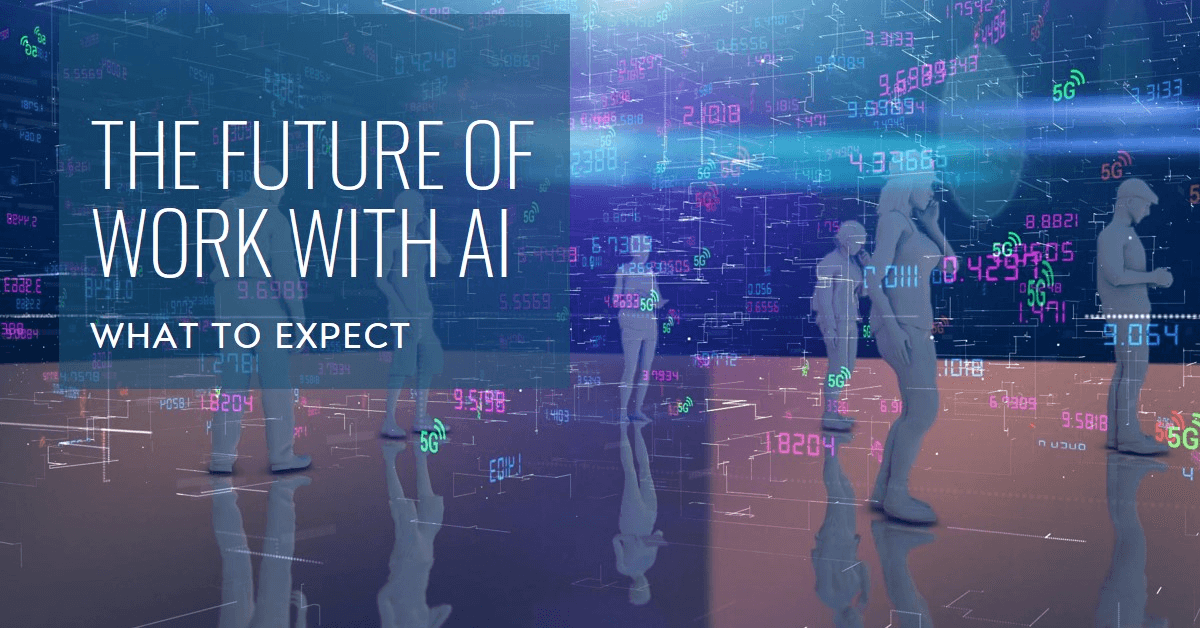Artificial Intelligence (AI) has become one of the most transformative technologies of the 21st century, and its impact on the future of work is undeniable. From automation to data analysis and personalized experiences, AI is reshaping industries and redefining the way we work. While some fear job displacement, others see an opportunity for innovation, growth, and improved work processes. This article delves into the profound impact AI is having across sectors, the benefits and challenges it presents, and what the future holds for employment trends.
The Growing Impact of AI Across Industries
AI is no longer limited to research labs or high-tech companies. It is now a critical tool across multiple sectors, improving efficiency, decision-making, and innovation. Here are some ways AI is transforming industries:
- Manufacturing: AI-driven automation has revolutionized the manufacturing industry. Robots powered by AI can perform repetitive tasks with greater precision, speed, and consistency than humans, reducing operational costs and improving production efficiency. Predictive maintenance powered by machine learning algorithms helps manufacturers avoid costly downtime by detecting issues before they become major problems.
- Healthcare: In healthcare, AI is helping doctors make more accurate diagnoses, develop personalized treatment plans, and even predict patient outcomes. AI-powered tools like IBM’s Watson assist in analyzing vast amounts of medical data to provide faster and more accurate solutions. Moreover, AI-driven surgical robots are enhancing the precision of surgeries.
- Finance: The financial sector is one of the early adopters of AI. From fraud detection and algorithmic trading to customer service through chatbots, AI is enhancing the efficiency and security of financial transactions. It also helps in assessing risk profiles and providing personalized financial advice.
- Retail and E-commerce: AI is reshaping the retail experience, from personalized recommendations to automated customer service. AI tools can analyze consumer behavior, predict trends, and provide better product suggestions. Moreover, AI is helping retailers optimize supply chains, manage inventory, and improve the overall customer experience.
- Education: AI in education is fostering personalized learning experiences. Intelligent tutoring systems and AI-powered adaptive learning platforms can cater to individual student needs, enhancing the effectiveness of education delivery. AI can also help automate administrative tasks, freeing up educators to focus on teaching.
Benefits of AI in the Workplace
The implementation of AI offers several benefits, including:
- Increased Productivity: AI can handle repetitive tasks, enabling workers to focus on more complex, creative, and meaningful work. Automation streamlines operations, resulting in faster decision-making and increased output without compromising quality.
- Cost Efficiency: By automating mundane tasks, AI reduces operational costs. Companies can allocate resources more effectively, minimizing human error and optimizing productivity.
- Enhanced Decision Making: AI systems analyze massive datasets quickly and provide insights that would take humans much longer to identify. This helps businesses make informed decisions, based on real-time data, improving outcomes and minimizing risks.
- Improved Customer Experience: AI-powered chatbots and virtual assistants offer faster, personalized customer service around the clock. Machine learning algorithms allow businesses to predict customer preferences and behavior, ensuring better recommendations and higher satisfaction.
- Innovation and Creativity: With AI taking care of routine tasks, employees can focus on innovation. This leads to greater creativity, the development of new products, and strategies that add value to the organization.
Challenges of AI in the Workplace
Despite the numerous benefits AI brings, there are also challenges and concerns that need to be addressed:
- Job Displacement: One of the most significant concerns surrounding AI is its potential to displace jobs. Automation threatens to eliminate roles in industries like manufacturing, retail, and customer service, where routine, manual tasks are being replaced by machines. While AI will create new jobs, the transition may cause temporary displacement and retraining challenges.
- Skills Gap: As AI evolves, the demand for workers with specialized skills in AI development, data analysis, and machine learning will increase. Many workers may find themselves unprepared for these new roles, creating a skills gap that requires investment in education, training, and upskilling.
- Ethical Concerns: The use of AI raises ethical questions, particularly around data privacy, surveillance, and bias in decision-making. AI systems learn from the data they are given, and if the data is biased, the AI can perpetuate those biases, potentially leading to unfair outcomes in hiring, lending, or policing.
- Dependency on AI: As AI becomes more integrated into the workplace, there is a risk of over-reliance on these systems. While AI can assist in decision-making, it should not replace human judgment entirely, especially in situations that require emotional intelligence or moral reasoning.
Future Predictions for Employment Trends
As AI continues to evolve, the future of work will be shaped by several trends. Here’s what we can expect in the coming years:
1. Rise of Hybrid Jobs
Hybrid jobs that combine technical and soft skills will become more prevalent. Employees will need to possess both AI-related technical skills and human-centric abilities like communication, creativity, and critical thinking. For instance, marketing professionals may need to work alongside AI tools to optimize campaigns, while customer service agents may collaborate with AI-driven chatbots to enhance customer experiences.
2. Increased Demand for AI Specialists
The demand for AI specialists—such as machine learning engineers, data scientists, and AI ethicists—will continue to grow. As more companies adopt AI technologies, there will be a need for experts who can build, maintain, and improve these systems. Organizations will also seek professionals who understand the ethical implications of AI and can ensure these systems are used responsibly.
3. Continuous Learning and Upskilling
Lifelong learning will become essential for workers to stay relevant in the AI-driven workforce. Employees will need to adapt to the changing nature of work by continuously updating their skills through training and education. Governments and businesses will need to invest in upskilling programs to help workers transition into new roles and remain competitive in the job market.
4. Collaboration Between Humans and AI
The future workforce will likely see greater collaboration between humans and AI. While AI can handle data analysis, automation, and decision-making, humans will be needed for tasks that require emotional intelligence, creativity, and complex problem-solving. Workers will increasingly interact with AI systems to enhance their own performance and productivity.
5. Emergence of New Jobs
While some jobs may be lost to automation, AI will create entirely new categories of employment. These include roles such as AI trainers, who teach AI systems to understand human behavior, and AI ethicists, who ensure that AI is used in a way that aligns with ethical principles. Moreover, industries like healthcare and education could see new opportunities for workers who can integrate AI into their professional practices.
Conclusion
AI is not just transforming how businesses operate but reshaping the very nature of work. While the technology offers immense potential for productivity, efficiency, and innovation, it also brings challenges such as job displacement and ethical concerns. As we move further into an AI-driven future, workers, businesses, and governments must be proactive in addressing these challenges by fostering a culture of continuous learning and responsible AI use.
The future of work will be defined by a delicate balance between human and machine collaboration, and those who adapt to this evolving landscape will thrive. AI’s role in the workplace is no longer a question of “if” but “how”—and understanding the opportunities and challenges it brings is key to preparing for the workforce of tomorrow.
For more insights on how AI is shaping the future, check out our article on AI’s Impact on Business Efficiency, or explore recent advancements in AI technology.
Internal Links:
External Links:










